Related Research Articles
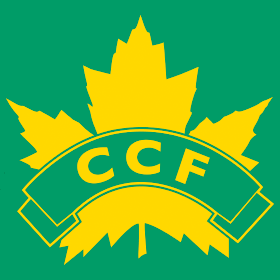
The Co-operative Commonwealth Federation ; from 1955 the Social Democratic Party of Canada, was a federal democratic socialist and social-democratic political party in Canada. The CCF was founded in 1932 in Calgary, Alberta, by a number of socialist, agrarian, co-operative, and labour groups, and the League for Social Reconstruction. In 1944, the CCF formed the first social-democratic government in North America when it was elected to form the provincial government in Saskatchewan.
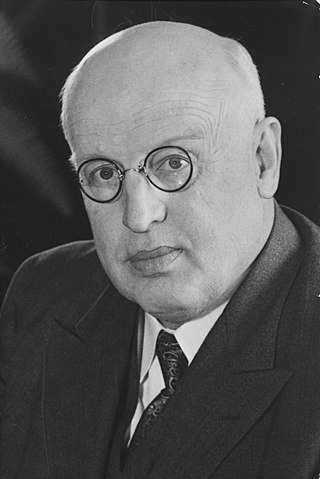
William Aberhart, also known as "Bible Bill" for his outspoken Baptist views, was a Canadian politician and the seventh premier of Alberta from 1935 to his death in 1943. He was the founder and first leader of the Alberta Social Credit Party, which believed the Great Depression was caused by ordinary people not having enough to spend. Therefore, Aberhart argued that the government should give each Albertan $25 per month to spend to stimulate the economy, by providing needed purchasing power to allow needy customers to buy from waiting businesses.
David Jay Bercuson is a Canadian labour, military, and political historian.

New Party was the interim name used by the new political party being established in Canada from 1958 to 1961 by the Co-operative Commonwealth Federation (CCF) and the Canadian Labour Congress (CLC), which eventually defined itself as a social democratic party. In 1958 a joint CCF-CLC committee, the National Committee for the New Party (NCNP), was formed and spent the next three years laying down the foundations of the "New Party". During the process of founding the party, the New Party name was used in the October 1960 Peterborough, Canadian federal by-election; which was won by its candidate, Walter Pitman. In August 1961, at the end of a five-day-long convention, the New Democratic Party (NDP) was born and Tommy Douglas was elected its first leader. Once the NDP was formed, the New Party clubs, and affiliates automatically ceased, and became part of the newly-formed party.

James Shaver Woodsworth was a pre–First World War pioneer of the Canadian Social Gospel, a Christian religious movement with social democratic values and links to organized labour. He was a long-time leader and publicist in the movement and was an elected politician under the label, serving as MP from 1921 to his death in 1942. He helped found the Co-operative Commonwealth Federation (CCF), a forerunner of today's New Democratic Party (NDP), in 1932.
John King Gordon (1900–1989) was a Canadian Christian minister, editor, United Nations official, and academic.
George Ramsay Cook was a Canadian historian and general editor of the Dictionary of Canadian Biography. He was professor of history at the University of Toronto, 1958–1968; York University, 1969–1996; Visiting Professor of Canadian Studies, Harvard University, 1968–69; Visiting Professor, and Yale University, 1978–79 and 1997. Through his championing of so-called "limited identities", Cook contributed to the rise of the New Social History, which uses "class, gender and ethnicity" as its three main categories of analysis. Cook's conception of "limited identities" was famously formulated in an article in the International Journal in 1967, Canada's centenary year, reviewing the state of contemporary scholarship on Canadian nationalism:
After six new books on the great Canadian problem — our lack of unity and identity — are we getting any nearer the source of the problem? Undoubtedly something is achieved: if nothing else one can wonder if the search is worth the effort. Certainly we should continue to try to understand ourselves; an unexamined nation is not worth living in. But it may be that the frame of reference is wrong. Perhaps instead of constantly deploring our lack of identity, we should attempt to understand and explain the regional, ethnic and class identities that we do have. It might just be that it is in these limited identities that "Canadianism" is found, and that except for our over-heated nationalist intellectuals, Canadians find this situation quite satisfactory.

Glendon College is a public liberal arts college in Toronto, Ontario, Canada. Formally the federated bilingual campus of York University, it is one of the school's nine colleges and 11 faculties with 100 full-time faculty members and a student population of about 2,100. Founded as the first permanent establishment of York University, the school began academic operation under the mentorship of the University of Toronto in September 1960. Under the York University Act 1959 legislation, York was once an affiliated institution of the University of Toronto, where the first cohort of faculty and students originally utilized the Falconer Hall building as a temporary home before relocating north of the St. George campus to Glendon Hall — an estate that was willed by Edward Rogers Wood for post-secondary purposes.
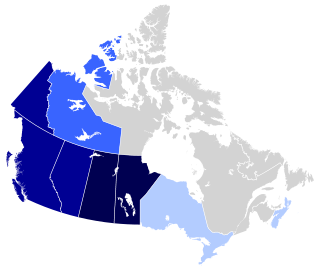
Ukrainian Canadians are Canadian citizens of Ukrainian descent or Ukrainian-born people who immigrated to Canada. In 2016, there were an estimated 1,359,655 persons of full or partial Ukrainian origin residing in Canada, making them Canada's eleventh largest ethnic group and giving Canada the world's third-largest Ukrainian population behind Ukraine itself and Russia. Self-identified Ukrainians are the plurality in several rural areas of Western Canada. According to the 2011 census, of the 1,251,170 who identified as Ukrainian, only 144,260 could speak the Ukrainian language.
The League for Social Reconstruction (LSR) was a circle of Canadian socialists officially formed in 1932. The group advocated for social and economic reformation as well as political education. The formation of the LSR was provoked by events such as the Great Depression and the completion of World War One as well as increased industrialization and urbanization.. The league esteemed 'rational moralism' as the ideology that could be utilized and applied to prevent suffering in Canada. The league aimed to act as an independent supplementary force influencing public policy reform in Canada during this tumultuous period. Working with both intellectuals and politicians, the league assisted in the creation of centralized social welfare and national assistance schemes. The LSR disbanded formally in 1942 during the Second World War.
Frank Hawkins Underhill, SM, FRSC was a Canadian journalist, essayist, historian, social critic, and political thinker.
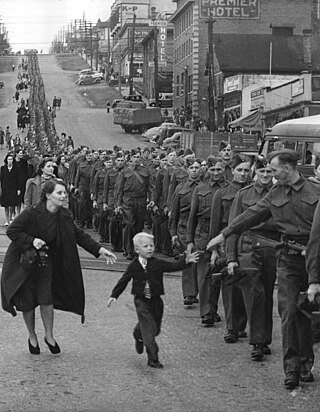
During the World Wars and Interwar Years, 1914–1947, Canada experienced economic gain, more freedom for women, and new technological advancements. There were severe political tensions over issues of war and ethnicity, and heavy military casualties. The Great Depression hit Canada hard, especially in export-oriented mining and farming communities, and in urban factory districts.

This is a bibliography of major works on the History of Canada.
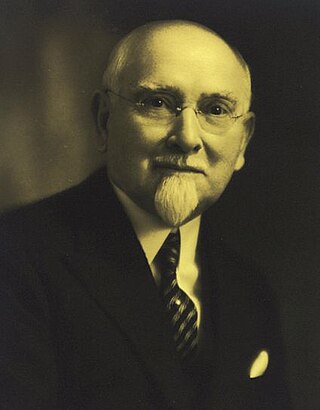
Edward Rogers Wood was a prominent financier in Canadian business. He was notable for his role in the development of the Brazilian Traction, Light and Power Company Limited and for his links with the "Peterborough Methodist Mafia" of George Albertus Cox.

York University Libraries (YUL) is the library system of York University in Toronto, Ontario. The four main libraries and one archives contain more than 2,500,000 volumes.
The following is a bibliography of Alberta history.

This is a bibliography of works on Canada. For an annotated bibliography and evaluation of major books, see also Canada: A Reader's Guide, by J.André Senécal, online.
This is a bibliography of works on the military history of Canada.
Albert Jacques Franck was a Canadian artist. He is known for his realistic paintings of Toronto winter scenes, dilapidated neighbourhoods and back lanes. His detailed paintings provide a historical record of conditions in some of Toronto's once less affluent neighbourhoods.
Carl Berger is a Canadian academic and author. He was a professor of Canadian history at the University of Toronto from 1964 until his retirement in 2003. His research interests are Canadian intellectual history and Canadian historiography. His 1976 book, The Writing of Canadian History, was the first in-depth study of Canadian historiography, eliciting critical praise and winning the Governor General's Award.
References
- ↑ Horn, Michiel (1999). Academic Freedom in Canada: A History . Toronto: University of Toronto Press. p. ix. ISBN 978-0-8020-0726-1 . Retrieved 7 July 2020.
- ↑ [Horn, Michiel, Becoming Canadian: Memoirs of an Invisible Immigrant, University of Toronto Press (Toronto, Ontario, Canada), 1997. Autobiography]
- 1 2 "Michiel Horn - University of Calgary". University of Calgary . Retrieved November 5, 2014.
- ↑ ""The Way Must Be Tried – York University A History" by Michiel Horn". York University. March 26, 2009. Retrieved November 5, 2014.
- Elizabeth Lumley (Editor), Canadian Who's Who 2006, University of Toronto Press, 2006, ISBN 0-8020-4054-3
- Michiel Horn, Becoming Canadian: Memoirs of an Invisible Immigrant, University of Toronto Press, 1997, ISBN 0-8020-7840-0